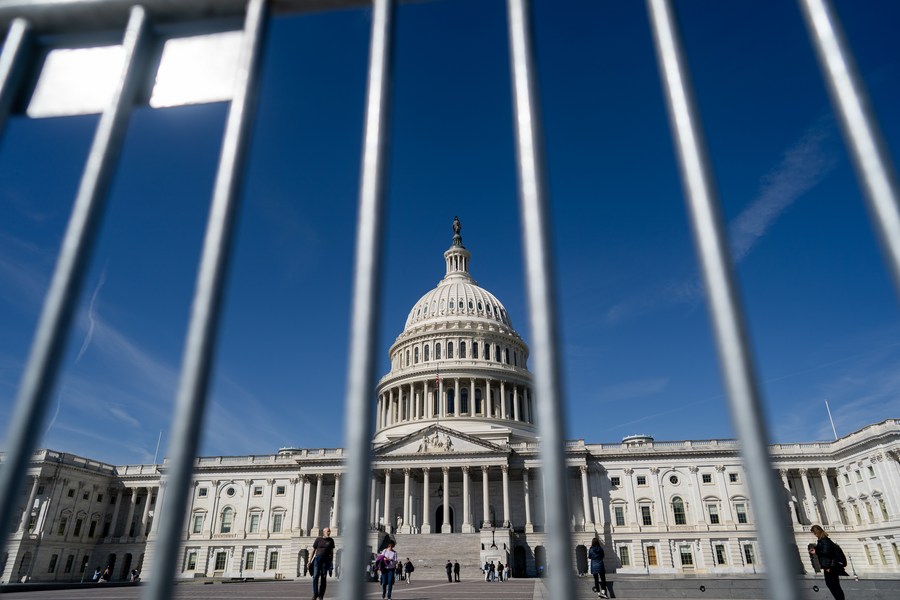
This photo taken on March 21, 2023 shows metal barricades placed near the Capitol building in Washington, D.C., the United States. [Photo/Xinhua]
By Wu Jianghao
The United States' groundless criticisms of China's trade and economic policies reflect its arrogance, prejudice and ignorance. The Joe Biden administration must remember that it is China that withstood the economic pressure and contributed the lion's share to global economic growth after the US triggered the 2008 global financial crisis. As a matter of fact, China's average contribution to global growth exceeded 30 percent over the past decade.
Equally important, a World Bank report says that by 2030, Belt and Road projects could help lift about 7.6 million people out of extreme poverty and 32 million people out of moderate poverty worldwide. As a major trading partner of more than 140 countries and regions, China's foreign trade has benefited billions of people, for which it has been praised by many countries.
Hence, it is necessary to ask three questions on the US' attempts to weaken the global economy.
First, when will the US stop violating the World Trade Organization's agreements? The US has been sued more than 100 times in the WTO. Last year, the WTO ruled against the US' Section 232 tariffs on steel and aluminum imports, saying that the tariffs imposed by the US do not qualify as a national security measure under WTO rules. But Washington has condemned the WTO's ruling, saying it is "flawed", and refuses to change course.
Besides, the US abused its "veto power" once again this year to reject a proposal to start the process of selecting new judges for the Appellate Body of the WTO, which became nonfunctional in December 2019 for lack of judges. The US' application of international rules in a selective way is a travesty of the "rules-based order". Plus, the US is the biggest source of instability in the world order.
Second, when will the US stop trampling on free trade? The US claims to be the "standard-bearer" of free trade, but it does not adopt the same approach toward China. For example, the US used "human right concerns" to smear Chinese products and technologies, and forced other countries to decouple their economies from the Chinese economy. It even restricts semiconductor exports to China. The latest example of its bullying is the one-sided congressional hearing on TikTok.
In the past, the US has imposed high tariffs on Japanese beef and steel, and declared Toyota a "national security threat". It has also taken "Super 301" action against Japan to force the latter to impose self-restrictions and implement structural reforms, which are unprecedented in the history of international relations and global trade.
Also, the US has bypassed the multilateral system and formed several exclusive cliques to introduce rules that cater only to its own interests. It undermines free trade in the name of national security, and sacrifices the security and development of other countries, even its allies, to safeguard its own security, revealing its hegemonic attitude.
And third, when will the US stop imposing sanctions on other countries? The US uses sanctions to maintain its global hegemony, and there has been a 933 percent increase in its sanctions from 2000 to 2021. The former Donald Trump administration, for instance, imposed more than 3,900 sanctions against foreign entities during its four years in office, meaning it imposed on average three sanctions a day.
The US has imposed sanctions on nearly 40 countries, affecting more than 3 billion people's lives around the world. These non-selective sanctions have been severely hampering global economic recovery in the post-pandemic era.
But the US does not do any self-introspection. Instead, it continues to level false charges against and smear other countries, especially China, using any means possible.
Which countries does China pose a threat to? China doesn't bully or wantonly announce sanctions against other countries, use long-arm jurisdiction, or suppress foreign businesses. How can anyone accuse it of coercion? In fact, no one has a better claim to the title of "master of coercion" than the US.
The US should not shift the blame onto China. Rather, it should fulfill its due responsibilities in international trade, and stop harming the global economy. We hope the Joe Biden administration realizes that mutual respect, peaceful coexistence and win-win cooperation are the only way forward for China-US relations. We also hope the US makes genuine efforts to bring bilateral relations back on the right track and give a shot in the arm of global recovery.
The author is China's ambassador to Japan.

 中文
中文



